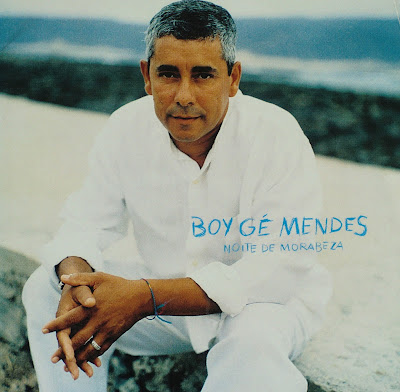In 1953 Gerard Mendes was born in Dakar, birthplace of a large number of Cape Verdean people. There he grew up among a colorful community of Malians, Senegalese, Guineans... and of course, Cape Verdeans. Attending a catholic school, he discovered his liking for singing, which he developed throughout parties and village festivals. Later Gerard gained stage experience in several Dakar's night-clubs as the Black & White, The Marseille, The Alabama and in some disreputable bars. But who cares! It felt good playing live and making some money.
In that period his repertoire consisted of a mix of styles ranging from popular Beatles and Rolling Stones songs, to Rhythm & Blues, Salsa and Caribbean music styles. He sang in French and in phonetic English or Spanish. In 1967 when he founded together with one of his brothers his first band -The Beryls- slowly his plans started to take shape. It marked the start of an exciting period of travelling to perform in bars, clubs and on festivals all over Senegal. After a number of years in which he further developed his musical skills, Gerard decided to broaden his horizon and left for Paris. In the lively Parisian Afro-Caribbean music scene he met several musical compatriots. This led in 1977 to the creation by Gerard, his younger brother Jean Claude and some friends among who Emmanuel Lima, from a 100% Cape Verdean band "Cabo Verde Show". The fresh and modern sound of the new band hit a sensitive string in the Cape Verdean diaspora in Europe and soon Cabo Verde Show became the most popular band in the Cape Verdean communities in France and the Netherlands. The creation of Cabo Verde Show marked a decisive step in the musical career of Gerard Mendes. Through the musical encounter with fellow countrymen of this Dakar-born Cape Verdean with his predilection for so many different musical styles, the desire to write songs in his native Cape Verdean Creole language aroused. We can hear the result of this musical change on the second Cabo Verde Show LP, which contains four compositions by Gerard Mendes written in the Creole language, which were all well received by the Cape Verdean community.
In 1980 he leaves Cabo Verde Show to form a new group together with his brother Jean-Claude: "Mendes & Mendes". The new formation is less successful then Cabo Verde Show, but Gerard wants more individual space to refine his talents and develop his musical desires.
A few years later, Gerard Mendes finally continues completely solo under the new artist name: "Boy Gé Mendes", the pet name he got as a young boy from his youth friends in Dakar. It is under this name that he recorded the song "Grito di bo fidje", that soon after will become the first international Cape Verdian music hit.
The success of Grito de bo fidje led to a period of intensive touring en performing in Europe, Africa and Latin America. During his travels, among which visits to Brazil, New York, Senegal and Cape Verde and the Netherlands, he enjoys the various musical atmospheres, sounds, themes and colours in the various countries. In 1995 he visits Rotterdam in the Netherlands - the main port of Europe and a city with a large Cape Verdean community. There he records the maxi single CD "Sururu" for the local Cape Verdean music label "Atlantic Music". The four songs on this mini album are the first reflection on the passed period.
The following year, during a visit to Cape Verde he meets his old pal Manu Lima again. For the first time in more than fifteen year, the two friends go to into the studio to record a new album "Di Oro" that is released in 1996. The return to Cape Verde pay off since the following year Boy Gé releases "Lagoa" a real musical traveloque containing incredible musical nuggets - Na tchon, Joia, Beijo de longe, Pampario, Cumba ieto, Choros, Ayuweh - in which the many influences of the past years interwine.
As soon as Lagoa came out he decided to leave Nice to settle in Cabo Verde, the archipelago of his ancestors. There the Dakar-born Cape Verdean traveller finally finds rest. In Mindelo he is inspired by the reality of a country where he had never lived before. New themes emerge and lead to his most Cape Verdean album "Noite de Morabeza" which came out in 1999. A less travelling album but with the same elegant- ,fluid- and suave sound that is characteristic for Boy Gé Mendes music.
Did things come full circle after his homecoming? I don't know but what strikes me is that he did not release a new album after 1999. His many fans will therefore have to content themselves with his live performances, because he still does. Happily he did participate in the 30 year anniversary album of Cabo Verde Show.
And so, in 2017, he participates in the many performances of Cabo Verde Show in the context of the 40-year anniversary of the band. But... it remains a meager consolation, because it is more than time for a new album by this fine artist.
After 21 years without releasing a new album, Boy Gé Mendes returns with the EP “Bate Tempu”. His last album “Noite de Morabeza” was released in 1999.
The new work of the singer of Cape Verdean origin was made available this Friday (18th) on the main digital platforms. With six unpublished tracks, “Bate Tempu” was all composed by Boy Mendes, and had the artistic direction of José da Silva. The production was in charge of Khaly Angel and Hernâni Almeida. You can buy this digital album at…. Qobuz.com
DISCOGRAPHY






















